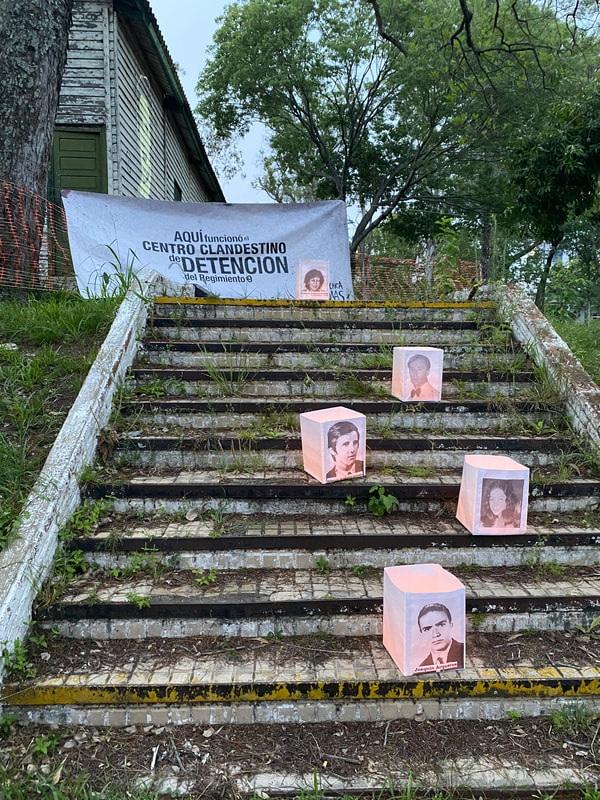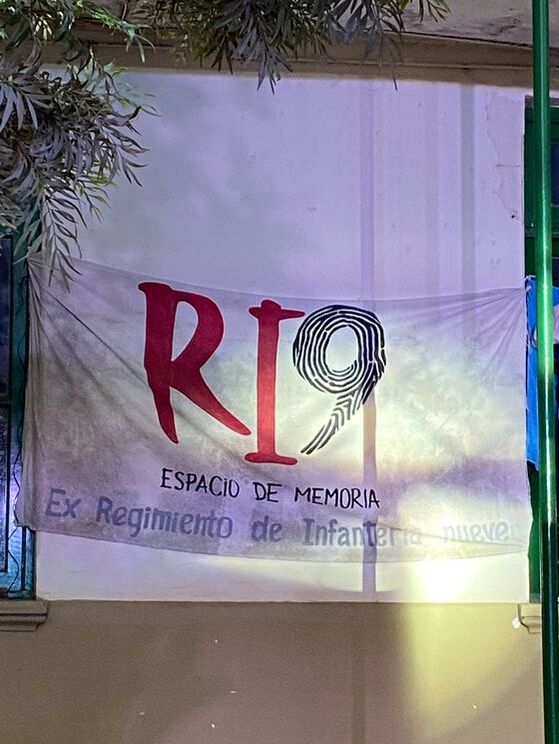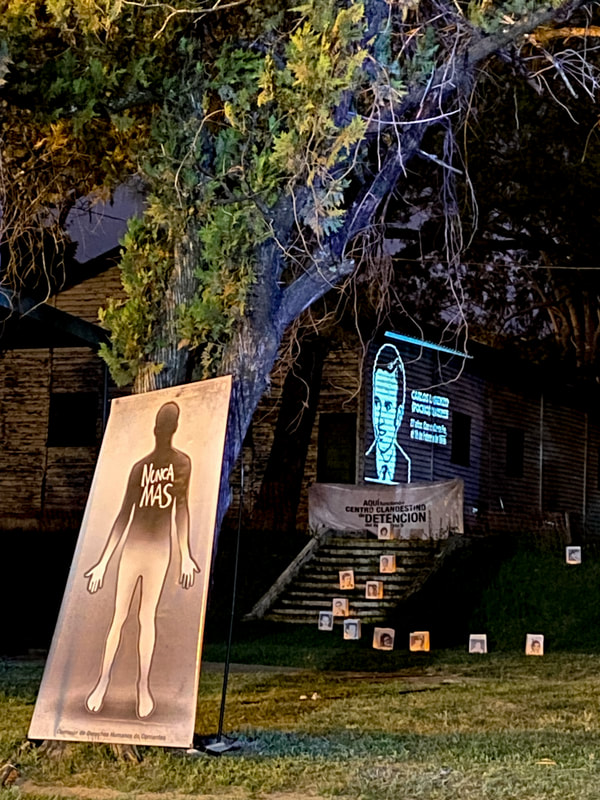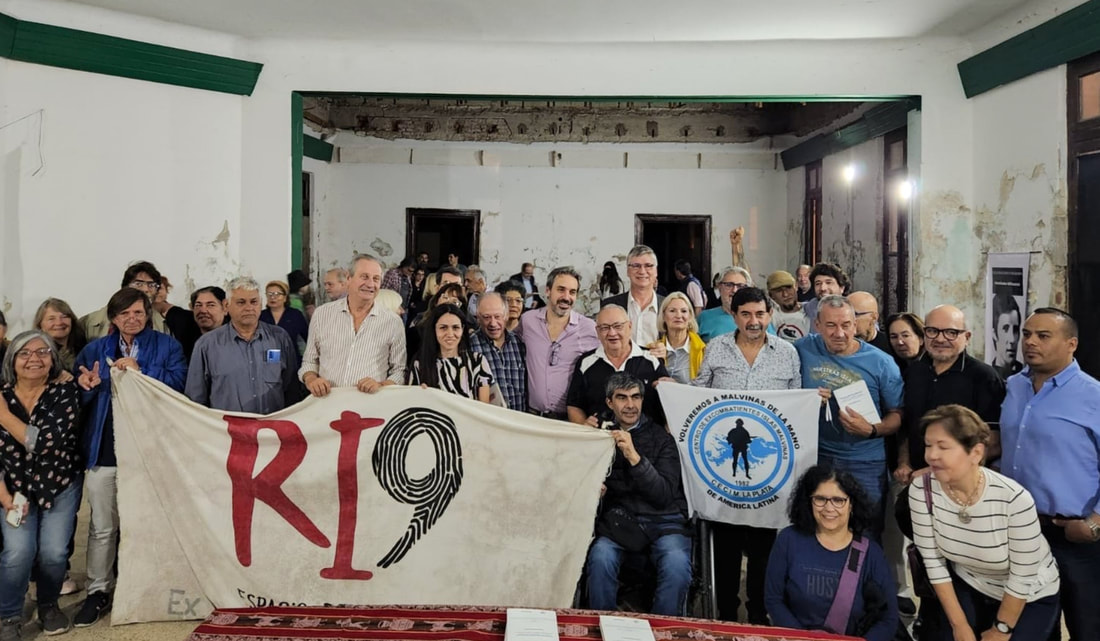RI 9 Space of Memory, Corrientes, Argentinaby Dot Tuer and Alberto GomezPreamble
For many years ECH contributor Alberto Gomez has worked with a group of human rights activists to establish the RI 9 Space of Memory, a memory site and cultural centre in Corrientes, Argentina. A former political prisoner and survivor of Argentina’s military dictatorship, Gomez is a core member of the Commission for the Promotion of the RI 9 Space of Memory, founded in 2017, and key negotiator for securing official state recognition of the RI 9 Space of Memory in 2022. His creative collaborator and partner Dot Tuer has documented many of the events held in the Space of Memory. In the text below, Tuer and Gomez tell the story of and pay tribute to the struggle of human rights activists and the survivors and families of victims of state terror in Corrientes to realize the RI 9 Space of Memory. The Story
On December 17, 2022, the RI 9 Space of Memory was officially inaugurated in the ex-Regimiento de Infantería 9, an army base in Corrientes, Argentina, where during the military dictatorship (1976-83) a clandestine detention and torture centre had operated in a warehouse barracks (el galpón). What was being celebrated that night was a triumph against all odds, marking the culmination of a decades-long struggle by human rights activists and the survivors and families of victims of state terror to confront societal indifference and military obstruction in their quest to have the former clandestine detention centre recognized and conserved. In the end, what they achieved was far more than the preservation of the warehouse barracks as a site of memory. Through determined advocacy and community organizing, they secured the legal transfer of a large part of the army base’s grounds and buildings from the Ministry of Defence to the Secretary of Human Rights for a Space of Memory, one that encompassed the barracks warehouse, el galpón; the Officer’s Club, Casino de Oficiales; various office barracks; a recreational area with playing fields and a swimming pool; and a small chapel with painted frescos. The story of how a large part of an army base in Corrientes came to be a Space of Memory has distinct phases. It begins with the presidencies of Nestor and Cristina Kirchner from 2003 to 2015, who promoted human rights and social justice initiatives, including the reopening of judicial trials against military perpetrators for crimes against humanity committed during the dictatorship and designating clandestine detention centres (CDCs) as state-protected sites of memory. During the Kirchnerista years, the survivors and families of the victims of state terror in Corrientes obtained a court order in 2004 to prevent any modification to the barracks warehouse due to its former use as a clandestine detention centre. A decade later in 2014 the galpón was incorporated into the national register of memory sites. By then, the RI 9 was no longer a working army base, but still under military control, and the shuttered galpón remained unmarked and inaccessible. What signalled the existence of a former clandestine detention centre on the base’s grounds were three granite columns engraved with the words, justicia, verdad, memoria, and a mural depicting three blindfolded and kneeling figures being tortured, located outside the base’s guarded perimeter at the entrance to the Casino (the Officer’s Club). With the election of the right-wing Mauricio Macri government in 2015, everything changed. Under Macri’s rule, judicial frameworks for human rights were eroded and state support for social justice organizations and memory work dismantled. Emboldened by these right-wing measures, the military solicited authorization in 2016 to demolish the galpón. Two years later in 2018, a powerful group of property developers associated with Mauricio Macri launched a proposal to develop the waterfront area of Corrientes. Their plans included razing the entire of the ex-RI 9 army base to make way for condos, hotels, and a shopping centre. The former army base, which was located on a large tract of land in the old colonial neighbourhood of Camba Cuá where the main avenue of the city, 3 de Abril, meets the Costañera (river promenade), had become prime real estate. Faced with the imminent threat of the galpón being disappeared, a broad-based coalition of human rights activists, survivors and families of the victims of state terror, unions, grass-roots social organizations, and H.I.J.O.S (Children for Identity and Justice against Oblivion and Silence) formed the Commission for the Promotion of the RI 9 Space of Memory. From 2017 until the onset of the pandemic in March 2020, the Commission’s core group of activists fought against the collusion of right wing, military, and real estate interests on many fronts. They launched legal challenges to have the galpón and the Casino (Officer’s Club) formally declared a Space of Memory and transferred to civil jurisdiction. They sponsored performance interventions by local artists and the H.I.J.O.S at the entrance to the Casino where the three pillars stood. After obtaining a court injunction granting the Commission access to the Casino, they fostered a range of activities to establish the Casino as a cultural and community hub, from film screenings and book launches to theatre performances and art installations. The Casino also became a meeting space for social activists, including feminist, trans, and anti-poverty organizations. At every turn, the military sought to obstruct access. Despite the court injunction granting the Commission use of the Casino, the Commission had to obtain a judge’s order every time an event was planned, or a meeting held, to force the military to provide right of entry. The military stripped the Casino of its infrastructure, right down to the electrical wires, water pipes, and toilets. Ex-military vigilante groups held noisy protests outside the Casino, decrying the desecration of the army base by left-wing militants and social agitators. The Commission’s core group of activists were undeterred. Each time they entered the Casino, they were confronting a history of state terror and remembering the presence of those who had been detained, tortured, and disappeared on the army base. While the Commission was able to fight for the Space of Memory through judicial means and based on human right laws that the Macri government could not rescind, the fight against the real estate developers’ plan to raze the base was a more shadowy struggle against the collusion of public officials, money laundering, and private business interests. When in 2019 the national government issued a decree to privatize and sell the ex-army base, it seemed that the waterfront development project was unstoppable. Once the ex-army base was sold to developers, all that had to be done was to bulldoze the galpón and the Casino in the middle of the night and the decades-long struggle to establish a Space of Memory was defeated. Then, everything changed, again. In November 2019, Macri’s government lost the election to a centre-left coalition that included Cristina Kirchner as Vice-President. Three months later, the global pandemic was declared and the sale of the ex-army base suspended. When the pandemic restrictions were lifted in 2021, the fates had realigned. The developers no longer had political influence at the national level and the Commission was negotiating with a government committed to human rights and had the support of high-ranking officials. After a year of negotiations, a national resolution transferred the section of the army base containing the clandestine detention centre from the jurisdiction of the Ministry of Defence to the Secretary of Human Rights and designated it a Space of Memory. With its official status secured, the RI 9 Space of Memory was now a place of historical revindication, one in which legal access to the galpón and surrounding grounds and buildings meant that all those who been detained and tortured there, then disappeared – political militants and union leaders, student leaders and agrarian league organizers, community workers and liberation theology priests – could be properly honoured and grieved. The night of the official inauguration on December 17, 2022, a commemorative performance embodied this process of veneration and mourning. In a single line, blindfolded young women and men walked down the steps of the shuttered galpón and across a grassy lawn to reach the entrance of the Casino. There they stood in a row as their blindfolds were removed by survivors and family members of the victims who had been sequestered in the galpón when it was a clandestine detention centre. The young men and women then handed to those who had freed them paper candle lanterns, on which were silkscreened photographs of those who had been held in the clandestine detention centre. The survivors and family members of the victims of state terror carried the lanterns back to the galpón. Embracing each other as they wept, they placed the lanterns on the steps of the galpón and on the lawn in front of it. As night fell, the lanterns flickered in the darkness, illuminating the photographs as ghostly presences. On the side of the galpón, large projected images of victims of state terror from Corrientes appeared and disappeared. Back at the Casino, speeches were made, and young people danced the night away. That night the Space of Memory began its work of remembering and healing. After the official opening of the RI 9 Space of Memory on December 17, 2022, which coincided with Argentina winning the World Soccer Cup the following day, the administrative and organizational work of the Space of Memory also began. In 2023, national funds were provided for re-installing the technical infrastructure removed by the military, and for office furniture and computers. No sooner had the electrical wiring been reinstalled, than it was vandalized in the middle of the night. What the right-wing could not sabotage was the spirit of resistance and joy, with the Casino filled with music and laughter and discussions and screenings and plays and workshops. On the grounds beside the shuttered galpón, which was being conserved as both a site of memory and for evidence in ongoing trials of military perpetrators, tours led by survivors attracted large groups of old and young, but mostly high-school and university students who were eager to learn of a history that had been silenced and repressed. On the National Day of Memory on March 24, for the first time the march that wound along the river promenade was able to end not outside the Casino, but in it, occupying the Space of Memory in the ex-army base where torture and disappearances had happened, and chanting in unison for the 30,000 desaparecidos (disappeared persons) Presente! Presente! Coupled with the energy and optimism of young social activists, the memory work of remembering and healing was creating future imaginaries of cultural resistance and political transformation. |
Commemorative Performance at El Galpón in the RI-9 Space of Memory, December 17, 2022. Photos courtesy of Dot Tuer.
|
Postscript Then, everything changed, once again. On November 17, 2023, Javier Milei, an ultra-right libertarian anarcho-capitalist, was elected the President of Argentina with 56% of the popular vote and inflation running at 200%. Within weeks, he had issued a manifesto of 350 executive decrees that included abolishing the Ministries of Education and Culture; renaming the Ministry of Labour the Ministry of Human Capital; privatizing all state resources; abolishing the central bank; devaluing the peso; dollarizing the economy; abolishing all rent and consumer controls; and slashing government jobs and funding. Milei also announced his intention to repeal the right to abortion, ferret out all feminists and LBGTQs, and bring back the sanctity of the family and heterosexual coupling. The Vice-President Victoria Villarruel has publicly stated that her mission is to fight against the distortion of historical memory in Argentina, which has exonerated left-wing militants while incarcerating military heroes who were only seeking to preserve Argentina’s social order, albeit with a few understandable excesses. For Villarruel, the last time there was a semblance of human rights in Argentina was during the military dictatorship. What the new Milei government will mean for the Corrientes Space of Memory remains to be seen. These are early days yet. How Argentines will react to even more dire spiraling inflation and threats from the Minister of Security that anyone who attends a public demonstration will be fired from their government job or lose their social benefits is unknown, though the General Strike and protest march called by the unions on January 24 drew historic crowds. What is certain is that whether funding is withdrawn from the RI 9 Space of Memory; or Milei ‘s government rescinds the land transfer to the RI 9 Space of Memory and sells the ex-army base; or Macri, who is now aligned with Milei, unleashes his development goons on the Corrientes waterfront; or all of the above; the work of a small group of activists who against all odds secured a Space of Memory in an army base, cannot be undone. It remains in photographs, in testimonies, in the recounting of this article, and in the hearts and souls of all those who care about social justice. January 25, 2024 |






















